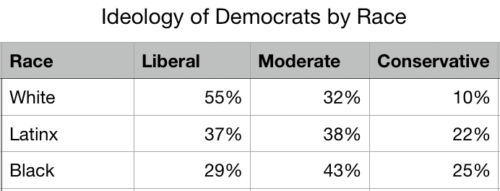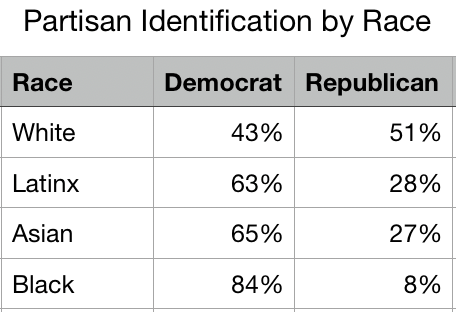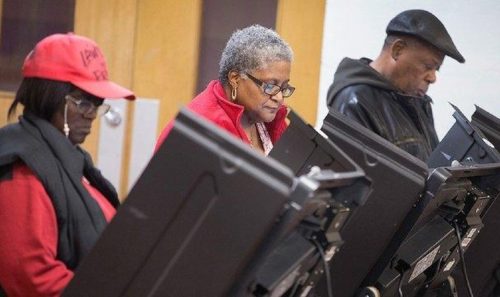I recently wrote about how people of color voted in the early states. Maybe you read the recent South Carolina results and thought this upset the trend – the trend of Bernie Sanders winning the votes of people of color? Not quite. The South Carolina results were consistent with earlier states. I think people base that thought on misconceptions about black voters. And so I’m writing now about two of these misconceptions.
‘Black People’ and ‘People of Color’
Americans often conflate ‘people of color’ with ‘black,’ forgetting that black people are only one component of ‘people of color.’ When Americans do this while discussing racism, they may erase the specifically anti-black features of U.S. social systems. Because of this, I’m clarifying at the outset that this is a post about black voters in particular, not voters of color in general.
Using black voters as a starting point reveals key differences, both among black voters and between black voters and, e.g., Latinx voters or white voters. It shows ideological gradation and differences in political methods. These are things white liberals often fail to notice. Why? Sometimes due to their liberal bubble – a world without rural conservatives, yes, but also one largely lacking black friends, neighbors, co-workers, et al. Perhaps more surprising is that it’s not just white liberals who harbor misconceptions about black voters. Sometimes people of color – even black people – harbor them.
Finally, I’ll note there’s nothing special about ‘two misconceptions.’ Americans probably harbor dozens of misconceptions about black voters. If you’d like to list more of them, be my guest. I’m focusing on two I find prevalent and interesting.
1. Black Democrats are more liberal than white Democrats.
I wrote about this one as a part of an earlier post, but I’d like to expand on it here. Not only is this one of the most common misconceptions about black voters, I think it’s one of the most common misconceptions about any group of voters. So, what’s going on? Am I saying black Democrats are more conservative than white Democrats?
Yes, that’s exactly what I’m saying. And the evidence for the claim is overwhelming. Here’s what Pew Research’s work says.

It doesn’t get much clearer than that. Almost twice as many white Democrats as black Democrats identify as liberal. Why do people find this surprising?
Part of the answer is that black voters – as a whole – are more liberal than white voters – as a whole. But this is a case where a relationship holding between two large groups, i.e., black voters and white voters, does NOT hold between two parts of those larger groups, i.e., black Democrats and white Democrats. Nor should anyone find this shocking. To assume that something true of a whole is also true of all its parts is to commit an informal logical fallacy. In philosophy, we call it a ‘division fallacy.‘
Explaining It Away
Lots of people want to hold on to the view that black Democrats are very liberal, and so they have to explain away all the contrary evidence. The view is such a common one that it has become a frequent source of error. It appears most often in highly educated circles, especially academia.
How do they do it? One way is to claim that black Americans and white Americans differ in their uses of terms like ‘liberal’ and ‘conservative.’ The idea is that black Americans are really liberals, but they describe their liberal views as ‘moderate’ or ‘conservative.’ A second way is to argue for some kind of generational change in the black electorate. The idea here is that young black Americans have redefined political terms or redefined how black America addresses issues of racism and racial disparities.
I don’t think either of those moves work, at least not as a way to explain away the prevalence of black Democratic conservatism. Both depend on slippage in the use of ideological terms. And perhaps that’s fine. But there’s little or no reason to believe such slippage is isolated to black Democrats or black Americans. Nor is there any evidence indicating that black Democrats’ stances on issues are in serious conflict with those of white Americans who identify with the same ideology. At least not on most issues.
If anything, the major generational change that’s occurring is more partisan than ideological. And it’s happening with white Democrats, not black Democrats. 20 or 30 years ago, there were plenty of white liberals in the Republican Party and white conservatives in the Democratic Party. There’s not much of that today.
Explaining It
Rather than trying to explain it away, let’s assume it’s true and try to explain it. What explains it? I think it’s the impact of racism on partisan identification. In short, there aren’t all that many black moderates and conservatives – but almost all of them are Democrats. By contrast, there are lots of white moderates and conservatives, but most of them are Republicans. White Democrats are a very liberal group because white conservatives self-select out of the Democratic Party. By contrast, black conservatives don’t.
The evidence? Here’s Pew Research data on partisan identification by race.

And so, there we have it. There aren’t many black conservatives, but there are far more black conservatives than black Republicans. White conservatives vote in Republican primaries, whereas black conservatives vote in Democratic ones.
On many issues, black conservatives fit better into the GOP than the Democratic Party. But the GOP remains the party of racism. Black conservatives would rather vote for the party they disagree with than the party that advocates racist ideas and policies that harm them. Probably the right choice.
South Carolina and the 2020 Democratic Nomination
All this is good background for understanding results from the South Carolina primary and predicting results in upcoming states. Did South Carolina contradict what we should’ve expected from the first three states?
No. Biden polls only a bit ahead of Sanders among black Democrats, which is an accomplishment for Sanders given that black voters are a better ideological fit for Biden. Biden won black voters in South Carolina by 45, but they’re older and more conservative than black Democrats in most states. Sanders pulled even with Biden among the younger and more liberal black Democrats who make up a larger proportion of black Democrats outside of the South.
And so, Biden will probably repeat these results in other southern states with electorates similar to South Carolina. See, for example, Alabama on Super Tuesday. But Sanders will do better in states with more Latinx voters and more young and liberal black voters. See, for example, California on Super Tuesday.
2. Black activists are representative of black voters.
When the media talks about black voters, it often turns to endorsements by prominent black activists or activist groups. And then the media acts surprised when candidates like Joe Biden or Michael Bloomberg – or Hillary Clinton – perform much better among black voters than the candidates activists endorse. The first misconception should help clear up the confusion here.
Black activists tend to be very young and very progressive. The black activist world is diverse – representing black Americans of all classes and backgrounds. But the core of groups like Black to the Future, the Black Youth Project, Black Womxn For, Color of Change, the Movement for Black Lives, Million Hoodies, et al. is entrepreneurial, highly educated, and tech savvy. Compared to leaders of these activist groups, black voters are much less likely to: have a college degree, have a high income, identify as liberal, live in a major city, own a business, support progressive policy ideas, use social media – especially Twitter, and so on.
And so, black activists aren’t representative of black voters. Support from black activist groups doesn’t predict who black voters will support. Indeed, Joe Biden and Michael Bloomberg poll well among black voters even though black activists almost universally loathe them. Why? Mostly due to these considerations of age, ideology, and other factors.
Sanders and Warren
Black activists propose excellent policy ideas that should form a key part of American political debate. The Movement for Black Lives platform alone could help form much of a progressive policy slate.
Bernie Sanders courted and won endorsements from many black activist groups in 2016, and both Sanders and Elizabeth Warren did the same in 2020. As a result, Sanders integrated racial justice and criminal justice proposals into his social democratic vision. Warren integrated targeted solutions for racially marginalized Americans, particularly black women and trans women of color, into her progressive policy parade.
This is great. But it’s not winning over many black voters. Sanders has done well among black voters, but mostly for unrelated reasons I’ll return to in the final section. Warren still hasn’t won over many black voters at all. Why?
Black Democrats are older and more conservative than the black activists pushing for these proposals. They oppose the proposals and tend to oppose the candidates who advocate for them. While Sanders and Warren acted with the best of progressive intentions – and ended up with better policy proposals – they didn’t help their electoral chances much by winning over black activists.
Local Politics and Exceptions
I suspect this isn’t news to people who closely study black Democratic politics. And observations accurate about national politics are often more accurate about local politics. Local black activist groups spend a great deal of time persuading older and more moderate black voters to accept their views on, e.g., ‘tough-on-crime’ policies like stop-and-frisk, harsh drug laws, and mandatory sentencing.
These issues hit local black communities hard due to rampant segregation. Many middle and upper middle income black professionals live in higher crime neighborhoods. Why? Redlining and other means of exclusion. Together with black nationalists who tend to adopt conservative views on local issues, they push a conservative line against many black activist proposals.
On these issues, I’d recommend James Forman Jr.’s book Locking Up Our Own. Forman describes black voter support for ‘tough-on-crime’ policy as a case of good intentions gone awry, especially black nationalist support. Black residents of higher crime neighborhoods wanted to get drugs and violence off the streets while providing social support for its users and victims. Politicians redirected those good intentions toward the former and away from the latter.
And, finally, I’ll again point to young black voters as a consistent exception to many of these moderate and conservative attitudes. Young black voters trend very progressive. And – like young voters of all races – they prefer Bernie Sanders. It’s likely that black activist support helped this along. But young black voters still make up a small enough percentage of total black voters that they’re not making a huge impact on overall numbers.
Persuading Black Voters
Given these two misconceptions, what’s a progressive candidate to do? Give up? No, not at all.
There are other differences between white Democrats and black Democrats. White Democrats tend to take a chance on a shiny new candidate they don’t know. Sometimes even a shiny new candidate with little or no resume. Like, say, Pete Buttigieg. By contrast, black Democrats tend to prefer candidates who have built strong connections with local communities.
Think, then, about the cases of Bernie Sanders and Elizabeth Warren. Sanders’s biggest mistake with black voters in 2016 wasn’t that activists endorsed him over Hillary Clinton. It was that he hadn’t yet built the kinds of community connections he needed to be taken seriously by black Democrats as an outsider. Given a second campaign, and a 4-year period in which to build these connections, he’s done much better the second time around.
He’s done an even better job of all this with Latinx communities. Warren, on the other hand, stands much closer to where Sanders stood in 2016. She wouldn’t have gotten close to Biden with black voters, even had she won Iowa and/or New Hampshire.
